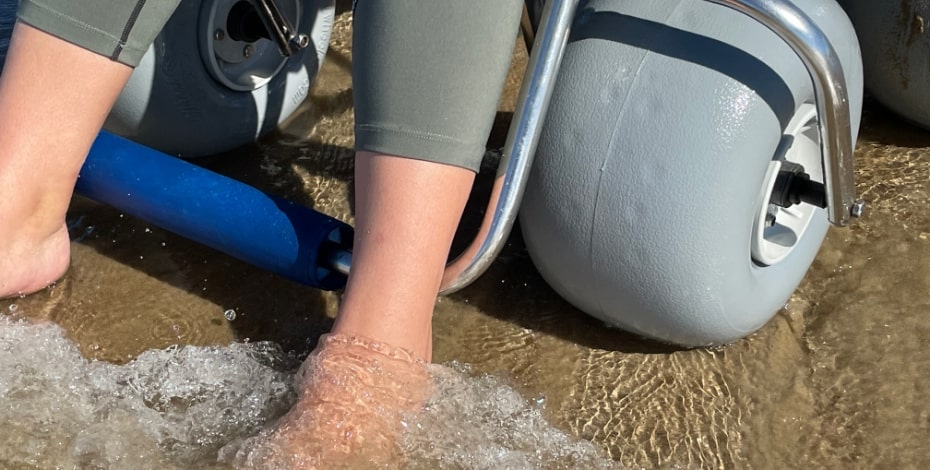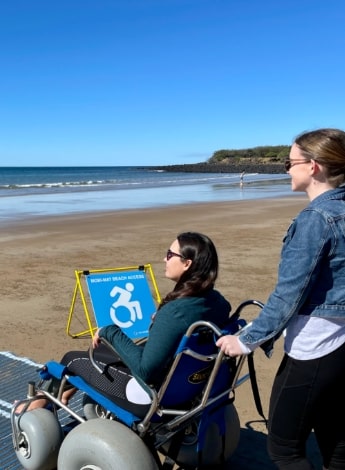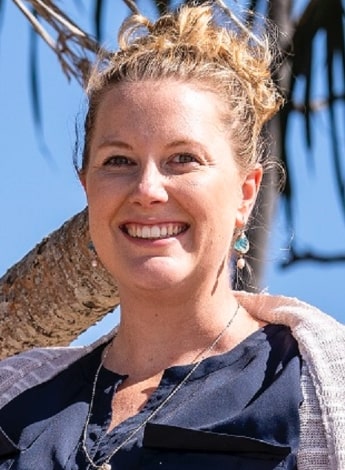
The importance of beach accessibility

Most Australians take their access to the beach for granted, but a Physiotherapy Research Foundation-funded project by Queensland researcher Sasha Job aims to make beaches more accessible to Australians with disabilities.
More than 85 per cent of Australians live within 50 kilometres of the beach but for many people with disabilities and mobility issues, it’s inaccessible.
The barriers are just too big.
It’s not just the soft sand and water that are issues; inappropriate access points and inaccessible facilities such as parking and amenities exclude many people with mobility limitations from taking advantage of the health and wellbeing benefits that beaches provide.
Sasha Job, APAM, a physiotherapy researcher at Central Queensland University, is hoping to change that through her research project called ‘Universal Beach Accessibility Hub (U-Beach): A pathway to increase physical activity participation, health and wellbeing in individuals with mobility limitations’.
Part of the project, titled ‘Health professional perspectives on the benefits, barriers, and facilitators of beach-based therapy for individuals with mobility limitations,’ was awarded a PRF Seeding Grant of $10,000 in 2021, with support from PRF corporate partner ASICS.
‘What we’re aiming to do is to develop an evidence-based, collaborative but also community-driven model of beach accessibility and what we’re hoping this model does is actually improve the health status of people with mobility limitations.
'With this model of accessibility, we plan to implement and evaluate beach-based therapy interventions,’ Sasha says.
The project stems from Sasha’s lifelong love of the beach.

Specialised beach matting and modified wheelchairs give people with disabilities better access to beaches. Photo supplied by Sasha Job/Central Queensland University.
‘It’s been a really important part of my life and, while working clinically as a physio, particularly in rehab settings, I had a number of patients who set goals of being able to walk on the beach, play with kids or grandkids at the beach or attend beach weddings,’ she says.
But for many patients, the environment is just too challenging and the barriers—the sand, the water, the weather, an inability to get down to the beach and the unavailability of parking and other amenities—contribute to preventing access for people with mobility issues and disabilities.
Sasha started a community-level project to improve local beach access for her patients and for people in her community.
‘As I started to get involved in the project and to do some research, I realised that there’s more to the beach than I had thought.
'What I had been feeling in terms of being more relaxed, more active and just happier at the beach was actually a phenomenon that was supported by evidence,’ Sasha says.
While she is currently enrolled in a master’s by research degree, she is in the process of upgrading to a PhD.
Working with her supervisors at Central Queensland University, Dr Steven Obst and Dr Luke Heales, she has reframed the community project as a research project with the aim of developing an evidence-based, collaborative and community-driven model of beach accessibility.
The project consists of two phases.
Phase 1 is about exploring the benefits, the barriers and the facilitators of beach accessibility for individuals with disability from the perspectives of people with disability, their carers and health professionals.
Phase 1A, which surveyed people with disabilities and mobility limitations, was completed last year and the findings will be published later this year.
Phase 1B, which is supported by the PRF Seeding Grant, will comprise a national survey for health professionals, including physiotherapists and occupational therapists, to get their perspectives on the benefits, barriers and facilitators of beach access, followed by a series of focus groups to get a deeper understanding of beach access in the context of healthcare.
COVID-19 delays notwithstanding, she hopes to have completed the national surveys and focus groups by the middle of 2023.

Sasha Job's research focuses on identifying and overcoming barriers to beach access for people with mobility limitations.
‘The key outcomes we’re trying to get from this particular research are, firstly, to explore physiotherapy and occupational therapy beliefs, experiences and perspectives of beach access, but specifically in the context of healthcare,’ Sasha says.
‘The second key outcome is to identify from a health professional’s perspective those key barriers, facilitators and benefits of visiting the beach as well as the risks of implementing beach-based therapy and ideas for implementing different types of therapies and mitigating for those different risks.
‘Obviously, it’s quite a complex environment and there are definitely risks—falls are one example, but there are also other considerations in terms of sun and heat exposure and dehydration.
'And then there are risks of drowning and harm related to water access as well.’
Phase 2 will involve the implementation of an inclusive and evidence-based model for beach accessibility, which will be used as a platform for a beach-based physiotherapy intervention for people with mobility limitation.
Ultimately, Sasha plans to develop a framework for beach access so that targeted and specific strategies can be developed by stakeholders including state and local governments, surf lifesaving clubs, community groups and healthcare providers for their local beaches.
‘It’s not a one-size-fits-all.
'Every beach is very different, every human body is very different, and if we just have one solution, it’s not going to fit every person or every location.
'The first step is to understand how to improve beach access, because if I want to run a physiotherapy program on the beach, I have to have an accessible beach.’
Once that’s in place, Sasha would like to see the development of beach-based goals, interventions and therapies for people with disabilities.
‘It could be a falls and balance class.
'It could be a strength class.
'It might be a class related to a specific condition, like stroke or Parkinson’s disease.
'It might be something specifically targeting land-based but also water-based activities, but it would be lovely to see the beach used routinely as a new treatment centre for us,’ she says.
‘It’s overwhelming at the moment because there are so many risks and there are so many barriers to getting to the beach, let alone doing therapy on the beach.
'But I think it’s a wonderful option for the future.’
This grant is supported by PRF corporate partner ASICS.
Main image: Photo supplied by Sasha Job/Central Queensland University.
© Copyright 2025 by Australian Physiotherapy Association. All rights reserved.





